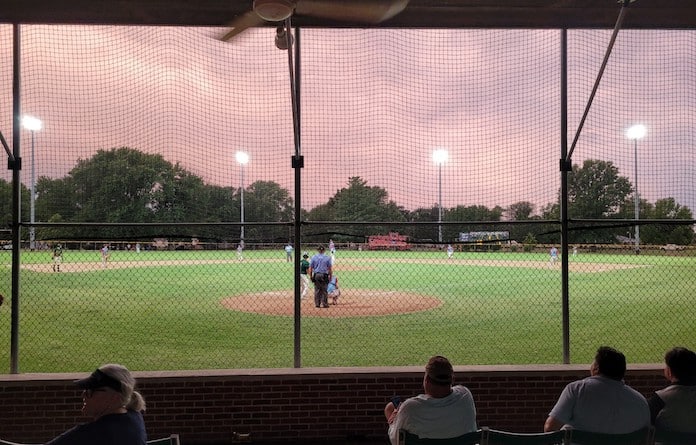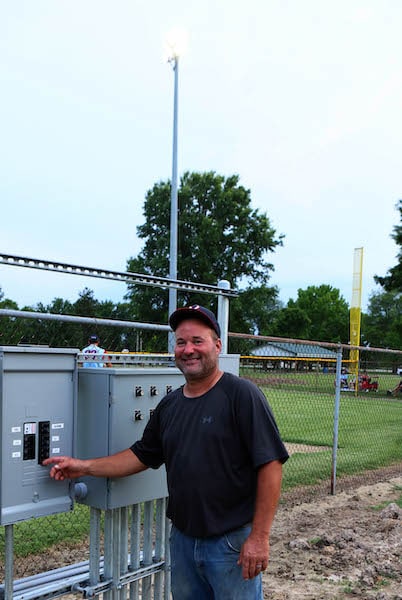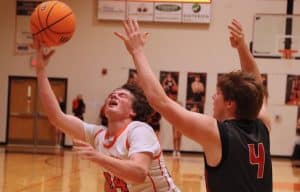Shining a light on Borsch history

With a bright new history being written, it’s important to look back at the beginning of the site of so many baseball memories past.
A project that was just completed with no public funding required, Borsch Memorial Park in Old Valmeyer hosted its first game under the lights Saturday when the host Valmeyer Lakers took on the Millstadt Green Machine.
A number of people were on hand for the occasion, including several former Lakers players.
Another milestone takes place this weekend: the first night games in the Valmeyer Midsummer Classic.
A dream of the late Dennis “Boog” Pieper has now become reality, marking a crowning achievement for a park nearing its 60th birthday.

Per information gathered by Midsummer Classic tourney committee member Craig Hoffmann, Borsch Memorial Park was officially dedicated Sept. 12, 1964, in memory of Harold W. “Push” Borsch.
Prior to it being named in Borsch’s honor, that location was known as Legion Park. The Valmeyer Optimist Club began developing this park in 1959, with a ballfield built there in 1961.
Prior to playing at this park, baseball games were at the Valmeyer High School diamond in the western part of Old Valmeyer. Home plate for that diamond sat where the tennis courts exist today just west of the railroad tracks.
Borsch was born Oct. 27, 1911 in Collinsville, the son of Daniel and Bertha Borsch. He married Salome Borsch, and they raised a daughter and three grandchildren.
Upon his graduation from East St. Louis High School in 1929, Borsch received a law degree from the University of Illinois in 1935.
He served in the U.S. Army during World War II as a signalman and received battle stars for his combat duty in Normandy and Northern France.
Borsch practiced law in East St. Louis until 1954, after which he operated law offices in both Valmeyer and Waterloo.
Borsch was heavily involved in Monroe County happenings, serving as a judge advocate for the Valmeyer American Legion and Waterloo Metzger-Crook VFW.
He helped organize and was the charter president of the Valmeyer Optimist Club. He was also president of the Monroe County Khoury League.
Borsch was the owner of The Cowbell Tavern, which was located south of Main Street in Old Valmeyer.
Prior to his death, Borsch and friend Louis Sondag had visions of what the park could become.
Borsch died in Valmeyer on Jan. 11, 1964, at the age of 52.
A September 1964 article in the Waterloo Republican newspaper read that “It is hoped that in the future this park will be made a community park with seats and picnicking available.”
The masters of ceremonies for the park dedication were Harold Baum of the Valmeyer Optimists, Armin Pieper of the Valmeyer American Legion and Cliff Asselmeier for the Village of Valmeyer.
The dedication address that day was given by Gene Sternberg, past international vice president of Optimist International.
A certificate presented to Borsch’s wife stated that “an annual evening of community participation will be here in his honor.”
The ballfield at Borsch Park initially featured in-the-ground dugouts, but those would often fill with seep water. The dugouts seen now at the park were built by Mike Degener, who performed the block work, and Chip Bieber, who built the roofs.
Other park improvements over the years included bleachers, a concession stand on the third base side, an outfield fence and a pavilion with BBQ grill that was built where much of the grandstand sits today.
The first bathroom facility at Borsch Park was built in 1971 and later expanded in 1995.
Taller foul poles were built by Luhr Brothers and installed in the late 1980s.
A hand-operated scoreboard was constructed in the 1990s, with an electronic scoreboard replacing it in the 2000s courtesy of Alois and Twyla Luhr.
The existing grandstand and bar area was built in 2003, with stadium seating also provided by the Luhrs in 2003.
Most recently, a tarp was purchased for the infield last year. The tarp was quickly put into use during the 2023 tournament, enabling the players to get in their games.
George Obernagel and others donated money toward the tarp.
Lights were replaced in the scoreboard and a new scoreboard control panel was purchased thanks to Obernagel.
As Hoffmann recounts, longtime Lakers manager Pieper – for whom the baseball field at Borsch Park is now named – had dreamed of stadium lights for decades.
Mike McCarthy, Pieper’s successor as Lakers manager, aggressively pursued getting support for this lighting over the past few years.
In February, Ameren began changing out poles very near to the diamond.
McCarthy’s cousin Eric Seidler, who works for Ameren, worked out a deal where the galvanized 100-foot poles were donated to the village for use at the park.
From there, McCarthy and others worked on securing private donations for the light fixtures, wiring, boring, conduit and other features.
And now, Dennis Pieper Field in Alois and Twyla Luhr Stadium at Borsch Memorial Park is a place of which all of those legendary namesakes can be proud.
The 52nd annual Valmeyer Midsummer Classic begins 9 a.m. Thursday with the Waterloo Buds taking on the St. Louis Printers. The final game on that first day pits the host Lakers against the Edwardsville Stags at 6:30 p.m.
Following planned youth baseball games Friday night, the Midsummer Classic continues Saturday and Sunday, including an 8 p.m. contest under the lights to close out Saturday action. The championship game is scheduled for 3:30 p.m. Sunday.
Longtime legendary Waterloo Buds manager Vernie Moehrs will be honored at this year’s tourney.
There’s a strong chance of rain on Thursday, meaning the schedule may be altered for Mother Nature.
Rain has canceled the classic before, but thanks to new lights, a tarp and the dedication of so many – those listed in this article and otherwise – baseball will be played and more memorable moments will be made this July 4 weekend at Borsch Park.






